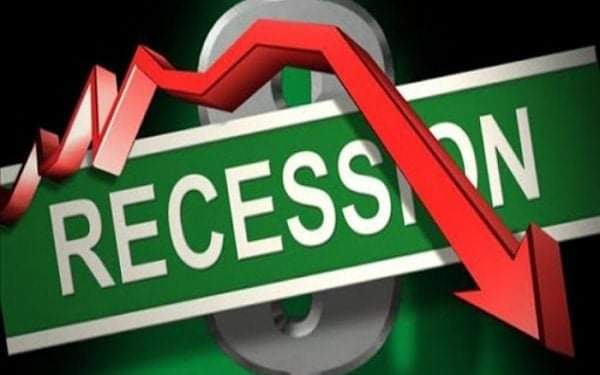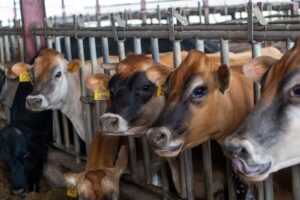
As the nation grapples with the adverse effects of its worst economic recession in more than three decades, poverty may worsen while unemployment will rise.
Food prices may gallop to the highest in recent times while the capital market may witness a slump , industry leaders and economic experts warned on Sunday.
From the manufacturing sector to financial markets, maritime, aviation, agriculture, oil and gas, household economy and others, the experts are worried about the outlook for the economy and called for concerted and focused implementation of fiscal and monetary incentives and reforms across the sectors.
The National Bureau of Statistics (NBS) at the weekend reported that Nigeria’s Gross Domestic Product (GDP) contracted by 3.62 per cent in third quarter of 2020. It was the second consecutive quarterly decline in GDP since the recession of 2016. The GDP declined by 6.1 per cent in second quarter 2020. The last time Nigeria recorded such cumulative GDP decline was in 1987, when GDP declined by 10.8 per cent.
The Lagos Chamber of Commerce & Industry (LCCI) said Nigeria is facing its worst economic situation in recent history with the double jeopardy of a stumbling economy and spiraling inflation, a perfect case of stagflation.
Director General of LCCI, Dr. Muda Yusuf, noted that the effects of the economic recession would be felt across businesses and households.
“Sales are slowing, profit margins are being eroded, production costs are escalating, unemployment is rising, poverty situation is worsening, purchasing power is weakening and there is a general social discontent. Regrettably, and as if these were not bad enough, the business community continues to grapple with policy, institutional and regulatory challenges impeding investment,” Yusuf said.
The LCCI boss added that while the reduction in the decline rate from 6.1 per cent to 3.62 per cent may suggest that the worst is over, further disruptions to economic activities can lead to aggravated effects on the economy, drawing back the recovery period.
On how to facilitate quick recovery, he said the nation needs to restore normalcy to the foreign exchange market by broadening the scope of market expression in the allocation mechanism.
According to him, the ports processes, especially the key institutions in the international trade processes need to be more investment friendly as trade is critical to recovery.
Yusuf canvassed the need to show greater commitment to the fixing of the structural issues to reduce production and operating costs for investors in the economy.
“Following the EndSARS experience, the state of internal security is beginning to impact negatively on investors’ confidence. Security presence is becoming less visible especially in the major cities. The psychological effects could adversely affect investment and economic recovery. We appreciate the setback suffered by the police as a result of the recent protests and we empathize with them. But we need to give security confidence to citizens and investors,” Yusuf said.
He also observed that incidents of kidnapping, banditry, herders-farmer clashes have not abated which have grave implications for investments.
He expressed optimism that the economy will resume growth in the first or second quarter of 2021, barring any new disruptions.
Chairman, Association of Securities Houses of Nigeria (ASHON), Chief Oyenwenchukwu Ezeagu said the economic recession could lead to huge selloffs in the nation’s capital market and further compounded the woes of the struggling private sector unless the government threads carefully with good combination of policies and committed implementation.
“The signaling import of whatever the governments do will influence the direction of the private sector actors. Either way, the capital market will continue to be the able partner for policy makers to rely to mobilize savings for channeling into projects that catalyze the ailing economy and gradually pull it out of this avoidable recession. However if we have learned nothing and continue to act as though all is well, the capital market may witness a sharp and huge sell-off which ultimately may hurt the market with the attendant erosion of the much-needed confidence in the market by not only the foreign but mostly the local investors. Nigeria’s way of managing this ugly development will determine what will ultimately become the narrative in the coming months,” Ezeagu said.
Deputy National President, Trade Union Congress (TUC), Comrade Chika Onuegbu, said Nigeria may not come out of its second recession in five years until third quarter 2021.
“Our revenue from oil, which contributes about 70 per cent, is barely enough to service Nigeria’s growing debts,” Onuegbu said, noting that price of oil may not exceed $60 per barrel by 2021.
According to him, the first step to take to pull the economy out is to tackle insecurity which has made it extremely difficult and almost impossible for people to go to their farms, and agriculture is one of the quick fixes to producing enough food to feed Nigeria’s growing population and to create jobs.
He called on the Federal Government to review the policy on the closure of the land borders.
Stakeholders in the maritime sector said the recession may worsen the declining fortune of the sector, urging the Federal Government to undertake comprehensive review of the sector with a view to making it more productive and efficient.
National President, Association of Nigeria Licenced Customs Agent (ANLCA), Tony Iju Nwanbunike said recession would affect the maritime industry because the sector is all about demand and supply, foreign exchange and principles of government on revenue.
He said while there are positive effects of recession in terms of focus more on local manufacturing, Nigeria may not be able to reap full benefits in this area because of its poor infrastructure.
“When we talk of the positivity of recession, it may not necessarily be for third world countries like Nigeria because we do not have the requisite infrastructure in place to benefit from it, but we must have to start from somewhere,” Nwanbunike said.
Chairman, Port Consultative Forum, Otunba Kunke Fokarib said the country needs funds from the sector to finance industry and create employment, wealth and empowerment and urged the government to focus proper attention on the maritime sector.
“Now is the time for the government to realise that shipping and ports are essential for the continuous functioning of the economy as they foster trade and international relations. Good maritime policies should be formulated, implemented and enforced to ensure every stakeholder in this sector abide by global best practices and adopt necessary technology to protect the interest of the nation, its economy, staff and other beneficiaries,” Fokarib said.
Prof Adebiyi Daramola, immediate past Vice Chancellor, Federal University of Technology Akure (FUTA), said the recession would drive up the cost of production in the agricultural sector while rising inflation would reduce domestic consumption, as purchasing power declines.
According to him, while the country is well-positioned to tap into new export markets, volatile weather conditions, land reform issues and a legacy of neglect continue to hinder agricultural output. In addition to these constraints, Nigeria lags behind regional competitors in mechanisation adoption rates, crop research and access to finance.
Former Executive Director, Keystone Bank Limited, Richard Obire, said Nigeria might be facing some serious headwinds over medium to long-term and government faces difficult choices to make to stimulate production and restore financial stability.
“We seem to be borrowing to finance debt repayment and to pay salaries of a bloated public bureaucracy. Investments in education, health and business-enabling physical infrastructure are grossly insufficient. Increased security challenges have severely affected farming leading to lower output and higher food and raw material input prices for consumers and industrial producers,” Obire said.
He said there was need to see two things happening together or individually to mitigate the adverse impact of the recession. First, is to see consumer demand for goods and services going up to stimulate increased production leading to more jobs and income growth. Secondly, production going up because of lowered input costs leading to lower prices which then drive increased consumer demand stimulating further increased production.
“Both prospects look very bleak in the short to medium term as forex price rises continue which together with increased fuel and energy costs have the effect of raising price levels generally and therefore lowering savings and consumer demand. We don’t seem to have much wiggle room on the fiscal side either,” Obire said.
Stakeholders and operators in the aviation sector said the recession would have far-reaching and debilitating effects on the sector.
Aviation experts, including President of Aircraft Owners and Pilots Association of Nigeria, Mr Alexander Nwuba; Head of Strategy , Zenith Travels, Mr Olumide Ohunayo and Group Chief Executive Officer , Nigerian Aviation Handling Company (NAHCO), Mrs Tokunbo Fagbemi noted that there could be further reduction in the sector’s revenue due to envisaged lower passenger traffic and other knock-off effects.
They said recession would threaten fresh investments for prospective carriers and could push existing operators into financial difficulty.
Experts said indigenous carriers , which were experiencing less than 50 per cent passenger load factor will be hard hit as struggling carriers yet to get a lifeline from the shocks of the COVID -19 pandemic and EndSARS nationwide protest will experience lower passenger traffic on account of contraction of the economy.
Nigeria Insurers Association (NIA) said the sector could be hard hit by the spiraling effects of economic recession.
”Insurance thrives on robust economic activity. If there is no economic activity, there will be no insurable interest because if people are not buying and selling profitably, if people are losing their jobs, there will be no disposable income for them to buy insurance,” Chairman, Nigeria Insurers Association (NIA), Mr. Ganiyu Musa said.
According to him, to revive the economy, the Federal Government needs to help affected sectors of the economy by providing bailouts. There are two things that the government can do to help the industry, the first one is on the revenue side and the second is on the cost side.
“This is the time that the Federal Government should provide bailout for the sectors that are most affected by the #EndSars violence. Government needs to take a very compassionate look at the insurance industry. It can come in many ways; one is through the regulator. Even if we don’t get cash palliative like the other sector but we get policy changes or policy softening to enable us focus our attention on the aftermaths of Covid-19 and #EndSars which we are meant to pay huge claims on.
“Secondly, government can help alleviate regulatory burden, to allow the industry focus on trying to cope with this extreme challenges. We expect the government to take a second look at the recapitalisation exercise going on in the sector. We will be happy if the date can be extended so that we can focus on the huge claims we need to pay. We are already engaging our regulator in this regard.
“Thirdly, this is the time for government to ensure that they pay up their premiums to minimize the leakages in the industry,” Musa said.
By Taofik Salako











